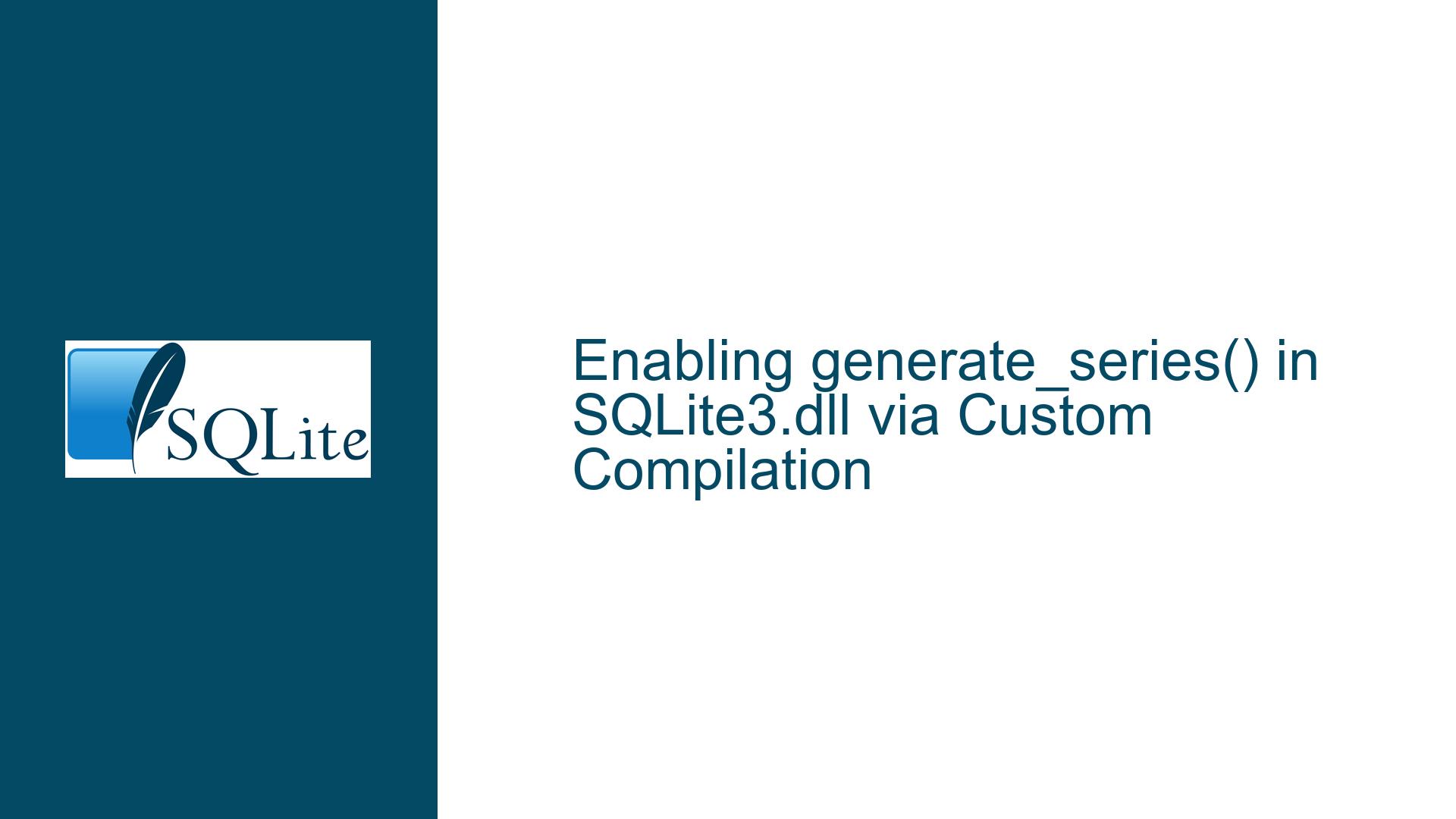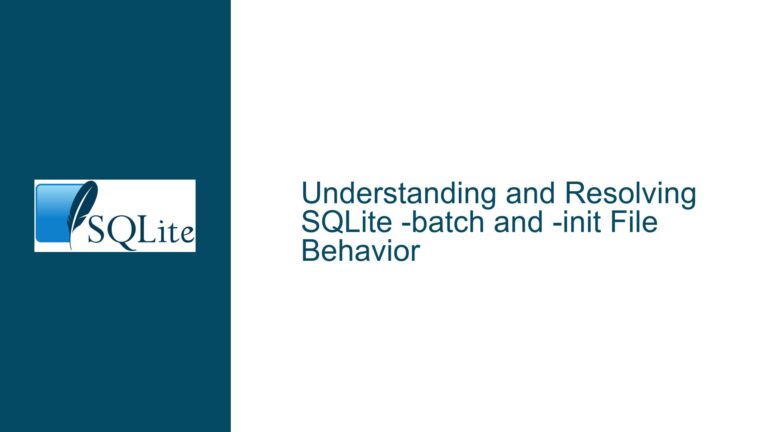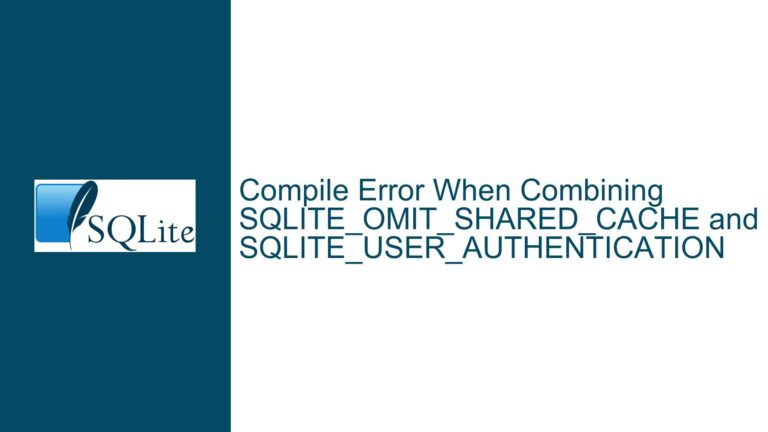Enabling generate_series() in SQLite3.dll via Custom Compilation
Issue Overview: Absence of generate_series() in Standard SQLite Builds
The generate_series() function is a powerful tool for generating sequential data ranges, often used in temporal queries, gap filling, or iterative operations. Unlike JSON functions (json_each, json_tree) or mathematical extensions (sqrt, pow), generate_series() is not included in SQLite’s default build configurations. This absence stems from SQLite’s design philosophy of keeping the core library lightweight, with non-essential features relegated to extensions or custom builds.
When users attempt to invoke generate_series() in environments relying on precompiled SQLite3.dll binaries (e.g., Python’s sqlite3 module), they encounter a "no such function" error. This occurs because the function is part of the Series extension, a loadable module distributed separately from the core SQLite amalgamation. The Series extension is not enabled by default during compilation, nor is it included in standard precompiled binaries.
The challenge lies in modifying the SQLite build process to include the Series extension’s code and initialize it automatically when a database connection is opened. This requires deep integration with SQLite’s initialization routines, leveraging undocumented or unsupported compilation flags to inject custom code into the library’s startup sequence.
Possible Causes: Compilation Flags and Extension Initialization
1. Missing Series Extension in Core SQLite
SQLite’s core distribution does not bundle the Series extension. While the source code for generate_series() exists in the SQLite source tree (as ext/misc/series.c), it is treated as an optional module. Unlike JSON1 or math functions, which are controlled by -DSQLITE_ENABLE_JSON1 or -DSQLITE_ENABLE_MATH_FUNCTIONS compilation flags, there is no analogous -DSQLITE_ENABLE_SERIES flag. This design forces developers to manually integrate the extension.
2. Undocumented Initialization Mechanisms
SQLite provides two undocumented, unsupported macros for customizing library initialization:
SQLITE_EXTRA_INIT: Allows developers to specify a function that runs duringsqlite3_initialize(), SQLite’s global initialization routine.SQLITE_CUSTOM_INCLUDE: Directs the compiler to include custom header files during the amalgamation build.
These macros are not part of SQLite’s public API and are subject to change without notice. Relying on them introduces risks: future SQLite versions might alter their behavior, and applications using them may break unexpectedly.
3. Static vs. Dynamic Linking
Even if the Series extension is compiled into SQLite3.dll, its functions (like generate_series()) must be registered with each database connection. In standard practice, extensions are loaded dynamically via sqlite3_load_extension(), but this requires enabling the SQLITE_LOAD_EXTENSION compile-time flag and often faces security restrictions in embedded environments like Python. Static linking of the extension into the DLL bypasses dynamic loading but demands careful initialization code injection.
Troubleshooting Steps, Solutions & Fixes
Step 1: Obtain the Series Extension Source Code
Download the SQLite source tree or extract series.c and series.h from the official repository. The Series extension implements a virtual table for generating integer sequences.
Key Code Snippets:
series.c: Defines thegenerate_seriesvirtual table module.series.h: Declares thesqlite3_series_initfunction for initializing the extension.
Step 2: Modify the SQLite Amalgamation Build
To embed the Series extension into SQLite3.dll:
Add Custom Include Directives:
DefineSQLITE_CUSTOM_INCLUDEto includeseries.hduring compilation:gcc -DSQLITE_CUSTOM_INCLUDE="\"series.h\"" ...Define the Extra Initialization Function:
Create a fileextra_init.ccontaining:#include "sqlite3.h" #ifdef _WIN32 __declspec(dllexport) #endif int sqlite3_extra_init(sqlite3 *db, char **pzErrMsg, const struct sqlite3_api_routines *pApi) { return sqlite3_series_init(db, pzErrMsg, pApi); }This function calls the Series extension’s initialization routine.
Compile with SQLITE_EXTRA_INIT:
Pass-DSQLITE_EXTRA_INIT=sqlite3_extra_initto the compiler, instructing SQLite to executesqlite3_extra_init()during library initialization.
Full Compilation Command:
gcc -DSQLITE_CORE \
-DSQLITE_CUSTOM_INCLUDE="\"series.h\"" \
-DSQLITE_EXTRA_INIT=sqlite3_extra_init \
-I. \
shell.c sqlite3.c extra_init.c series.c \
-shared -o sqlite3.dll
Step 3: Validate the Custom Build
After compiling, test the DLL in Python:
import sqlite3
conn = sqlite3.connect(':memory:')
cursor = conn.execute("SELECT value FROM generate_series(1, 5)")
print(cursor.fetchall()) # Should output [(1,), (2,), (3,), (4,), (5,)]
Step 4: Mitigate Risks of Unsupported Features
- Version Locking: Pin the SQLite version in your build system to avoid unexpected changes in
SQLITE_EXTRA_INITbehavior. - Fallback Mechanisms: Implement runtime checks for
generate_series()availability and provide alternative logic (e.g., recursive CTEs) if the function is missing.
Step 5: Alternative Approaches
Dynamic Loading with Python:
Load the Series extension dynamically usingsqlite3.Connection.load_extension(), but this requires:- A separate
series.dllbuild. - Enabling
SQLITE_ENABLE_LOAD_EXTENSIONin SQLite3.dll.
- A separate
Virtual Table Emulation:
Use recursive Common Table Expressions (CTEs) to simulategenerate_series():WITH RECURSIVE generate_series(value) AS ( SELECT 1 UNION ALL SELECT value + 1 FROM generate_series WHERE value < 5 ) SELECT value FROM generate_series;This avoids the need for the Series extension but lacks the performance and flexibility of the native implementation.
Step 6: Advocate for Official Support
Petition the SQLite team or Python maintainers to include the Series extension in default builds. This long-term solution would eliminate the need for custom compilation.
Conclusion
Integrating generate_series() into SQLite3.dll requires injecting the Series extension’s code via undocumented compilation flags, a process fraught with maintenance risks. Developers must weigh the convenience of static linking against the fragility of relying on unsupported features. Where possible, dynamic loading or SQL-based workarounds offer safer, albeit less efficient, alternatives.






